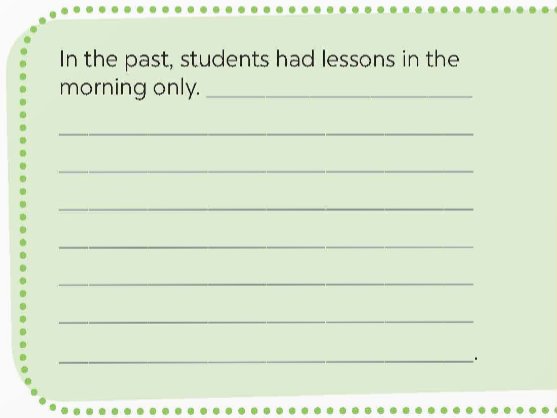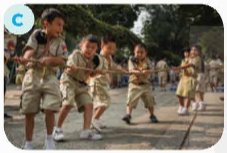Write a paragraph (100-120 words) about school days in the past.
You can begin your writing with:

Write a paragraph (100-120 words) about school days in the past.
You can begin your writing with:

Work in pairs. Ask and answer about school days in the past.
Your talk may include the following:
- school time (When...)
- school subjects (What...)
- leisure time activities (What....).
- summer holiday (How long...)
- means of transport to school (How...)
You can refer to the listening text for your answers.
Thảo luận (1)Hướng dẫn giảiA: When did students go to school in the past?
(Trước đây học sinh đi học khi nào?)
B: They usually only went to school on weekday mornings.
(Họ thường chỉ đến trường vào các buổi sáng trong tuần.)
A: What subjects did they study?
(Họ đã học những môn gì?)
B: They had the usual subjects like Math, Literature, Ethics, History and Geography.
(Họ học các môn thông thường như Toán, Văn, Đạo đức, Lịch sử và Địa lý.)
A: What did they do during their leisure time?
(Họ đã làm gì trong thời gian rảnh rỗi?)
B: They read books and played traditional games.
(Họ đọc sách và chơi các trò chơi truyền thống.)
A: How long did their summer holidays use to be?
(Kỳ nghỉ hè của họ thường kéo dài bao lâu?)
B: They felt endless! It was about three months.
(Họ cảm thấy vô tận! Nó khoảng ba tháng.)
A: How did they get to school?
(Họ đến trường bằng cách nào?)
B: They used to go to school by foot or by bike.
(Họ thường đi bộ hoặc đi xe đạp đến trường.)
(Trả lời bởi Nguyễn Quốc Đạt)
Listen again and choose the correct answers.
1. The conversation is generally about Thanh's _______.
A. school days
B. grandma's school days
C. grandma's life in the past
2. Thanh's grandma didn't have a lot of _______.
A. homework
B. lessons
C. subjects
3. Thanh's grandma _______ went to school on foot.
A. always
B. sometimes
C. never
4. Students in the past played _______ during break time.
A. computer games
B. games on mobile phones
C. traditional games
Thảo luận (1)Hướng dẫn giải
1. B 2. A 3. A 4. C 1. B
The conversation is generally about Thanh's grandma's school days.
(Cuộc trò chuyện nói chung là về những ngày đi học của Thanh.)
A. school days (những ngày đi học)
B. grandma's school days (ngày đi học của bà)
C. grandma's life in the past (cuộc sống bà ngoại ngày xưa)
2. A
Thanh's grandma didn't have a lot of homework.
(Bà của Thanh không có nhiều bài tập về nhà.)
A. homework (bài tập về nhà)
B. lessons (bài học)
C. subjects (môn học)
Thông tin:
Thanh: Did you have a lot of homework?
(Bà có nhiều bài tập về nhà không ạ?)
Grandma: Not a lot. And we never had extra lessons.
(Không nhiều lắm. Và bà không bao giờ có bài học thêm.)
3. A
Thanh's grandma always went to school on foot.
(Bà của Thanh luôn đi bộ đến trường.)
A. always (luôn luôn)
B. sometimes (thỉnh thoảng)
C. never (không bao giờ)
Thông tin: Well, we walked all the time. And we didn't have shoes or sandals. We were walking barefoot.
(À, bà đi bộ suốt. Và bà không có giày hoặc dép. Bà đi chân trần.)
4. Students in the past played traditional games during break time.
(Học sinh trước đây chơi trò chơi truyền thống trong giờ ra chơi.)
A. computer games (trò chơi máy tính)
B. games on mobile phones (trò chơi trên điện thoại di động)
C. traditional games (trò chơi truyền thống)
Thông tin: And we played traditional games such as hide-and-seek, tug of war, skipping, etc.
(Và bà chơi những trò chơi truyền thống như trốn tìm, kéo co, nhảy dây, v.v.)
(Trả lời bởi Nguyễn Quốc Đạt)
Listen to the talk between Thanh and his grandma and tick (✔) the things you hear.
1. Three-month summer holiday
2. Lessons in the morning only
3. A lot of extra lessons
4. Walking barefoot
5. Chatting on mobile phones
Thảo luận (1)Hướng dẫn giải✔ 1. Three-month summer holiday (Kỳ nghỉ hè ba tháng)
✔ 2. Lessons in the morning only (Chỉ học vào buổi sáng)
3. A lot of extra lessons (Rất nhiều bài học thêm)
✔ 4. Walking barefoot (Đi chân trần)
5. Chatting on mobile phones (Trò chuyện trên điện thoại di động)
(Trả lời bởi Nguyễn Quốc Đạt)
Match each phrase with the right picture.
1. walking barefoot
2. talking face to face
3. traditional game



Thảo luận (1)Hướng dẫn giải1 - b. walking barefoot
(đi chân trần)
2 - a. talking face to face
(nói chuyện trực tiếp)
3 - c. traditional game
(trò chơi truyền thống)
(Trả lời bởi Nguyễn Quốc Đạt)